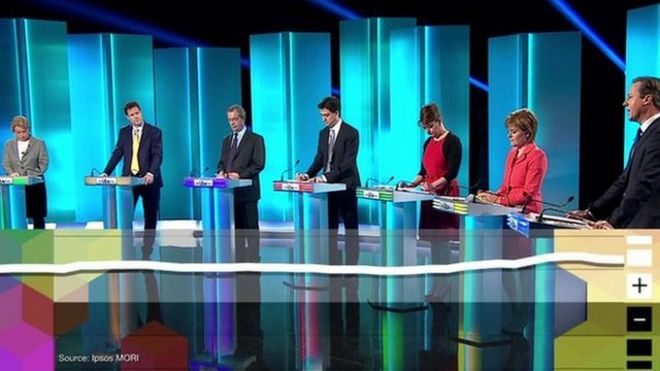 |
| The party leaders on stage in Salford |
All three attacked the Lib-Lab-Con austerity programme, pointing out that Ed Miliband talks 'the language of anti-austerity' but in fact has supported many of the measures that the Coalition have implemented which have cut into the economy and our public services. Sturgeon in particular was impressive - something which I did not expect to find myself saying - laying out plans to increase spending over the next few years, which would reduce the deficit at a slower rate but which would help to stimulate demand in the economy, rather than the devastation of massive further cuts.
Bennett, too, made a hugely important point when she put forward the case for long-term investment. Just because a project cuts a little into the balance sheet now, does not make it not worth doing if it will bring huge benefits for the future - something which many of today's politicians and journalists seem to have forgotten.
Leanne Wood - despite her slightly, ah, wooden performance - should be applauded for facing down the anti-immigration vitriol of Nigel Farage and defending immigration as something which brings a boost to our economy and immeasurable benefits to our country in terms of cultural diversity. That the leaders of the establishment parties have bought in to Farage's fearmongering on immigration is deplorable, and the Plaid leader was right to speak out.
Most importantly, though, the leaders of these three left-of-centre parties have injected an intangible but vastly important concept back into political discourse: that politics should be about making life better for people, not just about money and power. If GDP growth slows a little or the deficit takes a year or two longer to pay off, but public services are more easily available and the standard of living for ordinary people goes up, that that is a trade-off worth making. The obsession with unsustainable profiteering which has infected mainstream politics has finally been challenged, in front of a 7.7 million-strong audience.
Even if the results of Thursday's debate are not felt in time for May the 7th, it is my hope that this will be a watershed moment in British politics. As we move into an era of multi-party elections and co-operative politics, hopefully the rampant individualism of the last thirty-five years will start to fade.
No comments:
Post a Comment